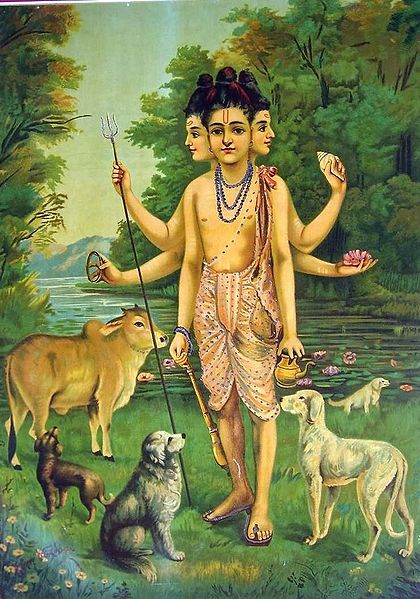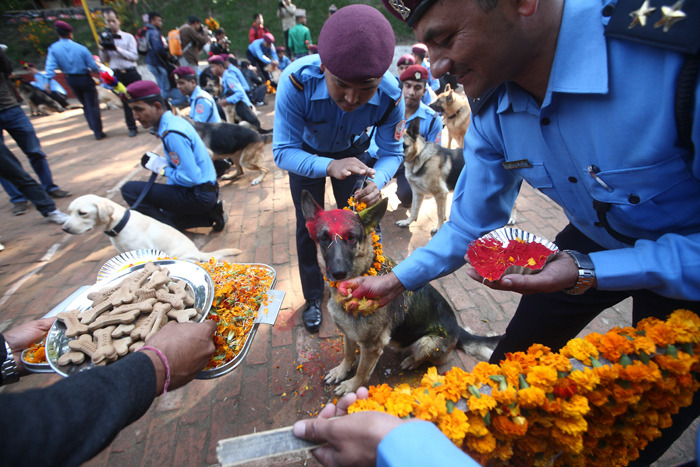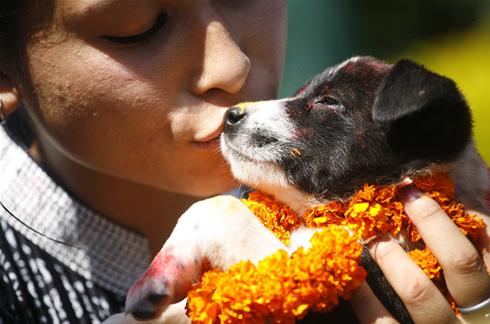 Dogs in Hindu Religion is mainly associated with Bhairava form of Hindu God Shiva. Bhairav is shown along with a black dog. In some paintings, the god takes the role of Vahana or vehicle of Bhairava. There are also some people who believe that dogs are an incarnation of Bhairav.
Dogs in Hindu Religion is mainly associated with Bhairava form of Hindu God Shiva. Bhairav is shown along with a black dog. In some paintings, the god takes the role of Vahana or vehicle of Bhairava. There are also some people who believe that dogs are an incarnation of Bhairav.
For some Hindu communities dogs are a link to the world of the dead.Next most important instance of dog in Hinduism is associated with Lord Dattatreya – an incarnation of Trimurtis – Brahma, Vishnu and Shiva. Dattatreya is followed by four dogs, which  symbolically represent the four Vedas and his complete mastery over the Vedas.The most popular instance of dog in Hindu scriptures is in the Mahabharata. Here God Yama takes the form a dog and follows the Pandavas during their final journey and tests the Dharma of Yudhishtira, the eldest of the Pandavas.
symbolically represent the four Vedas and his complete mastery over the Vedas.The most popular instance of dog in Hindu scriptures is in the Mahabharata. Here God Yama takes the form a dog and follows the Pandavas during their final journey and tests the Dharma of Yudhishtira, the eldest of the Pandavas.
Indra, the king of (devas) has a dog named Sarama. This dog is believed to
have helped the Devas in recovering the cows stolen by demons.The Abode of Yama – Hindu god of death – is guarded by two dogs named Sarameyas. They are believed to have four eyes each.Dogs are mostly associated with Hindu religious ceremonies for dead ancestors, parents and relatives. Some Hindu communities believe that dogs are a link between the living world and the world of the dead. So they make offerings to the dogs.One of the most popular ceremonies associated with dog in Hindu religion takes place in Nepal.
 It is known as Kukur Tihar and is observed during the Diwali period (October – November). People worship the companion of Bhairab or Bhairav. A red tika is applied on the day on dogs; they are then garlanded and are offered food. The ritual is sort of a thanksgiving to dogs that guard homes and protect wealth, women and children.There are some Hindu astrologers who recommend feeding black dogs to escape from the malefic effects caused by Saturn (Shani) and Rahu in horoscopes. After the great Mahabharat war, the Pandavas ruled the kingdom for 36 years.
It is known as Kukur Tihar and is observed during the Diwali period (October – November). People worship the companion of Bhairab or Bhairav. A red tika is applied on the day on dogs; they are then garlanded and are offered food. The ritual is sort of a thanksgiving to dogs that guard homes and protect wealth, women and children.There are some Hindu astrologers who recommend feeding black dogs to escape from the malefic effects caused by Saturn (Shani) and Rahu in horoscopes. After the great Mahabharat war, the Pandavas ruled the kingdom for 36 years.
Then they decided to relinquish their kingdom and go on their last journey – Sanyasa and Vanaprastham. The five Pandava brothers – Yudhishtira, Bhima, Arjuna, Nakula and Sahadeva –and their wife Draupadi left for the Himalayas. They were followed by a Dog.They started climbing the Himalayan mountains and soon one by one starting with Draupadi they fell down and fainted and died. Now only Yudhishtira, the eldest of Pandavas, was left and keeping him company was the dog.
Without looking back the two continued their journey.Then one day suddenly Indra appeared before Yudhishtira in his chariot. Indra wanted to take Yudhishtira to heaven in the human form as he was the most pious among Pandavas and he was the one who had never strayed from the path of Dharma.Yudhishtira refuses to enter the chariot without his brothers and Draupadi. Indra assures him that he will meet with them in heaven as they have already reached heaven.Yudhishtira then asks the Dog to enter the chariot.
But Indra objects to it. Indra states that we eat food by sitting on the floor and it is not possible to have a dog roaming in the same place. He also indicates that the presence of a dog will defile heaven. It is considered that a mere glance of a dog deprives the sacraments of their consecration.But Yudhishtira is adamant; to him the dog appears as one who has been devoted, loyal in the time of loss of his brothers and Draupadi.
 He was faithful and loving in the hour of entire solitude. He cannot be happy in heaven as he would be haunted by the thought of the dog so true.Finally, Yudhishtira decides to not to go with Indra and decides to stay with the Dog.Soon, the very dog for which Yudhishtira refused Heaven transformed to Dharma, the God of righteousness.This was a final test on Yudhishtira who never swayed from the path of righteousness.Thus Yudhishtira had the rare honor of reaching heaven in the human form.
He was faithful and loving in the hour of entire solitude. He cannot be happy in heaven as he would be haunted by the thought of the dog so true.Finally, Yudhishtira decides to not to go with Indra and decides to stay with the Dog.Soon, the very dog for which Yudhishtira refused Heaven transformed to Dharma, the God of righteousness.This was a final test on Yudhishtira who never swayed from the path of righteousness.Thus Yudhishtira had the rare honor of reaching heaven in the human form.
SARAMA: She is the female dog of the Gods and also the mother of all dogs. The Bhagavata Purana regards Sarama as the mother of all beasts of prey. But in this Purana, Sarama is a reference to a daughter of Daksha and not a bitch. Sarama derives her name by being a quick runner. As Supadi, she ‘has good feet’ and as Subhaga, she is the ‘fortunate one’. Deva-shuni means ‘divine bitch’. The offspring of Sarama is called Sarameya.
In the four eyed form, the metronymic Sarameya accompanies Lord Yama. In the tenth Mandala of the Rig Veda, Shyama and Sabala are described as Sarama’s daughters. They are messengers of Yama, Lord of the Law. They are guardians to the path of heaven, protecting man on their path. But the Griya Sutra decribes Shyama and Sabala as sons of Sarama and Sisara as their father. RIG VEDA: According to the Rig Veda, the bitch, Devashuni assists Lord Indra to recover divine cows stolen by demons called Panis. The loot is hidden in a cave.
Sarama pursues the track of the thieves and recovers it by the path of truth. ‘She, the bitch of Indra, undertook a perilous, pioneering journey to the Panis….Both sun and moon are dogs of heaven and sons of Sarama.’ The Panis try to convince Sarama that they could share the loot but she refuses: RV 10.108.2 As such credit is given to Sarama for having recovered the milk of the cattle which symbolises nourishment for humanity.
In the third Mandala of the Rig Veda, sage Vishwamitra described Sarama as ‘knowing’ to suggest her intuitive powers. The Jaiminita Brahmana adds more details to the story. The cows belong to Angiras or Brihaspati. The Panis dwell in Vala, a stone cave. There they fail to lure Sarama to their side. So Sarama makes a deal with Lord Indra that her children will be fed. Taittiriya Brahmana: Sarama is the goddess in guise of a dog.
 She was deputed by Lord Indra to roam the mortal world and she witnesses starving. She Sarama created water to sustain food and irrigated the fields. She also found the divine cows and they provide milk to mankind. SARAMA SYMBOLISM: Sarama is considered to be the power of Light and probably Dawn as she is ‘the traveller and the seeker who does not herself posses the Truth but rather finds what is lost.
She was deputed by Lord Indra to roam the mortal world and she witnesses starving. She Sarama created water to sustain food and irrigated the fields. She also found the divine cows and they provide milk to mankind. SARAMA SYMBOLISM: Sarama is considered to be the power of Light and probably Dawn as she is ‘the traveller and the seeker who does not herself posses the Truth but rather finds what is lost.
Thus she symbolises the Ushas. Kidnapping of the cows represents the disappearance of the bright cows or rays of the Sun. Sarama, the Dawn, finds them. She is then followed by Indra, the God of Light. VASTOSPATI: In Rigveda 7.55.2, mythology of heavenly dogs, Sarama’s role is different from the sun and the moon, the other sons of Sarama. He is the guardian of the house of Varuna and his name is Vastospati.
 He is Rudra. The Gods had created Vastospati, the guardian of sacred ordinance, vratapa, out of their poem, the Raudra Brahman. In ths sky, Vastospati assumes the shape of the dog of heaven. LORD RUDRA: He is the star of the stars in the sky, Sirius, the most exalted of all the stars.
He is Rudra. The Gods had created Vastospati, the guardian of sacred ordinance, vratapa, out of their poem, the Raudra Brahman. In ths sky, Vastospati assumes the shape of the dog of heaven. LORD RUDRA: He is the star of the stars in the sky, Sirius, the most exalted of all the stars.
In the morning dawn, before sunrise, Sirius is the fire-colored boar of heaven and at night he is the silver golden watchdog of the sky: Rigveda 1.114.4. In his most ancient figure, he was the Dog Star, the hound of heaven, gnashing his formidably bright teeth. When the sun of equinox rose in Rohini, he was the star Mrgavyadha, the archer, the hunter of the antelope shooting forth arrows of rays.
The dog or hound of heaven is Vastospati, the Guardian of the Dwelling. These figures of the antelope and the hound were not envisioned simultaneously. Rudra’s has more than one form and name and only one of them was seen or thought of at a time.
BHISHMAKA: He is the King of Vidarbha and the father of Rukmani, Krishna’s wife. In his previous birth, he is said to be a temple priest dedicated to Shiva Padha Puja ot worshiping the Lord’s feet. Usually the prasada, after being offered to the Lord and closure of the puja is served to a dog that waits outside temple premises. The dog then accompanies the priest home and keeps guard along the way. This dog only ate temple prasada.
The priest had great affection towards the dog as well. One dark night, by mistake, the priest accidentally walked over the dogs face. In its nature, the dog instantaneously bit the priest before it could realise that the person it bit was the priest whom the dog admired. The dog regretted its action and thereafter did not accept the food. After some time it died in front of the same Shiva temple. The gods, seeing this great gesture of loyalty from the dog, awarded the post of the Suryan or Sun with the name Vivasawan. The priest had also died in memory of the dog. In reverence to his Shiva Padha puja, in his next life, this Brahmin priest took birth as a King of Vidarbha. He was called Bhishmaka.
by various sources































